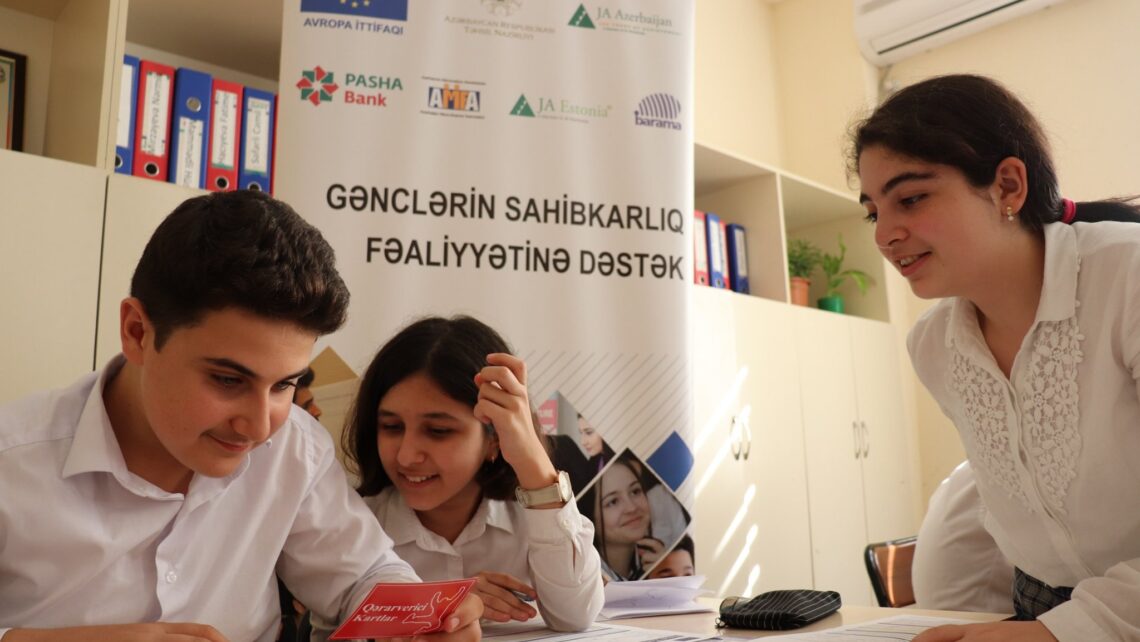Context: Azerbaijan has a relatively youthful population in the subregion of North and Central Asia. According to the State Statistics Committee of Azerbaijan Republic, 22.8 per cent of the total population are youth – those aged 14–29, as defined in Azerbaijan (2021). Due to this demographic trait, the youth policy of Azerbaijan is an important part of State policy, and the government continues to ensure that measures are in place to create favourable conditions for young people to realize their knowledge and skills, and their potential to contribute to socioeconomic development.
Implementation of programme/ initiative: Entrepreneurship for Youth is a project launched from November 2018 which ran until June 2021. It was implemented and funded by the European Union, in partnership with the Azerbaijan Government’s Ministry of Education, PASHA Bank, Junior Achievement Azerbaijan, and Azerbaijan Micro-finance Association. The project had a total budget of about USD 420,000. The overall objective of the project was to promote entrepreneurial education and financial literacy at secondary schools, as well as vocational education and training centres, through the involvement of civil society organizations and the private sector. The project was implemented over four stages: developing high-quality content, teaching resources and tools for delivery of entrepreneurship education and financial literacy to students; building capacity and training teachers; piloting/testing student training and evaluation; and preparing policy briefs and recommendations for the integration of entrepreneurship education and financial literacy into the educational curricula through the application of good practices. However, during the implementation process, some learning materials and student/teacher trainings had to be conducted through online means as a consequence of the COVID-19 pandemic.
Main challenges: Due to a lack of awareness of entrepreneurship in educational curricula, students have had limited knowledge on the subject. For instance, for most students, the project was their first experience in entrepreneurial education. Teacher training was also an important part of the project as this was applicable to them; the assessment of financial health among teachers showed that, after two years of project implementation, in 2021, 93 per cent had a better understanding of financial literacy, compared to 37 per cent in 2019.
Results achieved: In total, the project involved some 4,900 students (49 per cent girls) and 170 teachers from 48 secondary schools and 4 vocational education and training centres. Some 79 per cent of the students reported that the programme helped them better understand the importance of managing personal finances, and 90 per cent felt confident in managing money. Furthermore, as part of implementation within the project framework, students were engaged in online and offline entrepreneurial training and workshops, and 100 youth teams joined a business video contest and innovation camp. This engagement inspired 30 per cent of students to start and lead a family business, and 70 per cent of female students believed they would be successful in the longer-term if they were to start their entrepreneurial journey.
Moving Forward: In the foreseeable future, the project’s partners will continue to invest in projects in this direction, as they believe entrepreneurship is the basis of the economy. Entrepreneurial education, which was the core element of the project, teaches the important skills of innovative and creative thinking, helping youth develop a more flexible mindset. Having participated in the project, some students are looking to further their education in the field of entrepreneurship to creatively market their products, and grow their future professional careers as entrepreneurs and intrapreneurs.
Replicability: Entrepreneurship for Youth’s focus on addressing future progressive demands has shown its resiliency in its response to the COVID-19 pandemic through its flexible modalities using the online platform. The project is an exemplary model of working to ensure the education system can better respond to the needs of the labour market for its youth, through skills development, and how meaningful opportunities to contribute to economic diversification and job creation in Azerbaijan can be realized. The project also demonstrates how joint efforts between the government, private sector and civil society can bring far-reaching results to the socioeconomic development of the country.
Acknowledgement:
This good practice was kindly prepared by Ms. Alysha Brahmantiara Putri.
References:
https://eu4azerbaijan.eu/entrepreneurship-for-youth/
https://eu4business.eu/news/entrepreneurship-for-youth-project-kicks-off-in-azerbaijan/
https://eu4azerbaijan.eu/entrepreneurship-for-youth-project-closing-ceremony/
https://www.stat.gov.az/source/demoqraphy/ay/
Project Details
Date: September 23, 2021
